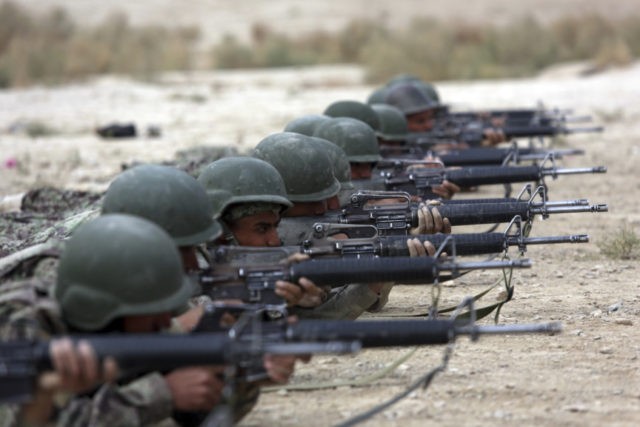A three-day meeting between the Taliban and a “high-ranking delegation of the United States” in Qatar to find an end to the war in Afghanistan yielded “no agreement,” the terrorist group proclaimed on Monday.
In contrast, the U.S. special envoy for peace negotiations declared that both sides agreed to a deadline of April 2019 to end the conflict.
In a statement, Zabihullah Mujahid, a spokesman for the Taliban, declared:
Senior representatives of the Islamic Emirate [Taliban] held a meeting with a high-ranking delegation of the United States in Doha, capital of Qatar, on the 14th, 15th, and 16th November 2018, to find a peaceful solution to the issue of Afghanistan.
These were preliminary talks, and no agreement was reached on any issue. The representatives of Islamic Emirate discussed the current situation of Afghanistan, insisted on the requirement of an Islamic government and finding a true solution to the problems…predictions by some analysts are all baseless and hold no truth.
The Taliban spokesman’s comments came after Reuters, citing local media reports, reported Sunday that U.S. special envoy Zalmay Khalilzad indicated that he hopes to strike a peace deal with Taliban jihadis by April 2019.
“Taliban leaders have not agreed to any deadline because we are winning on all fronts,” an anonymous Taliban member told Reuters.
While in Kabul to push for U.S.-backed reconciliation between Kabul and the Taliban, Khalilzad told reporters he hopes “a peace deal is reached before April 20 next year,” when Afghanistan is planning to hold a presidential election.
Khalilzad, an Afghan national, said he remained “cautiously optimistic” about the peace talks.
U.S. President Donald Trump’ administration appointed the diplomat to hold direct talks with the Taliban. He met the terrorist group at its political office in Qatar last month.
“The second round of talks went on for three days. This clearly proves that both sides are exercising patience and caution during their diplomatic engagement,” an unnamed U.S. official told Reuters, referring to the recent meeting.
An anonymous Taliban member told Reuters that Khalilzad’s public statement that the group believes it will “not win militarily” angered senior jihadis who warned U.S. officials against mixed messages that could muddle the peace negotiations.
“We were astonished to see Khalilzad’s statement in Kabul on Sunday. He wrongly quoted us, saying that the Taliban admitted that militarily we would not succeed,” a senior Taliban member in Afghanistan told Reuters.
Another anonymous senior Taliban member said Khalilzad’s move to declare a deadline showed how desperate the U.S. was to withdraw foreign forces.
Echoing President Trump’s strategy to end the Afghanistan war, which was the American commander-in-chief unveiled last year, Khalilzad said Sunday that the end-state of the negotiations would be “peace and a successful Afghanistan, one that doesn’t pose any threats to itself and to the international community”.
Reuters noted:
The Taliban spokesman was not immediately available for comment but two senior Taliban leaders, speaking on condition of anonymity, said the Taliban leaders will present a new set of demands to Khalilzad.
The insurgents, fighting to expel foreign forces and defeat the Western-backed Afghan government, last month presented demands to Khalilzad that included a timeline for the withdrawal of U.S. troops and the release of senior Taliban from jails.
Pakistan, which the U.S. has accused of backing the Taliban, released one of the group’s co-founders and another high-ranking commander last month.
While the Trump administration has intensified its peace-seeking efforts in recent months, the Taliban has continued to wreak havoc.
Despite an unprecedented bombing campaign against Afghan jihadis under Trump’s watch, terrorists, primarily the Taliban, control or contest about 45 percent of Afghanistan, according to the latest assessment by the U.S. Special Inspector General for Afghanistan Reconstruction (SIGAR).
The 28,529 casualties sustained by the Afghan National Defense and Security Forces (ANDSF) since former U.S. President Barack Obama declared the American combat mission over at the end of 2014 dwarf the 55 suffered by the United States troops over the same period, a testament to the Afghans commitment against terrorism.
On Saturday, U.S. Joint Chiefs Chairman General Joseph Dunford contradicted Afghan President Ashraf Ghani’s assertion that the Taliban is losing the war.
“We used the term stalemate a year ago and relatively speaking it hasn’t changed much, but … we do believe that the Taliban know that at some point they have to reconcile,” he said.
The Trump administration has made reconciliation between Kabul and the Taliban the primary goal of its Afghan strategy.

COMMENTS
Please let us know if you're having issues with commenting.